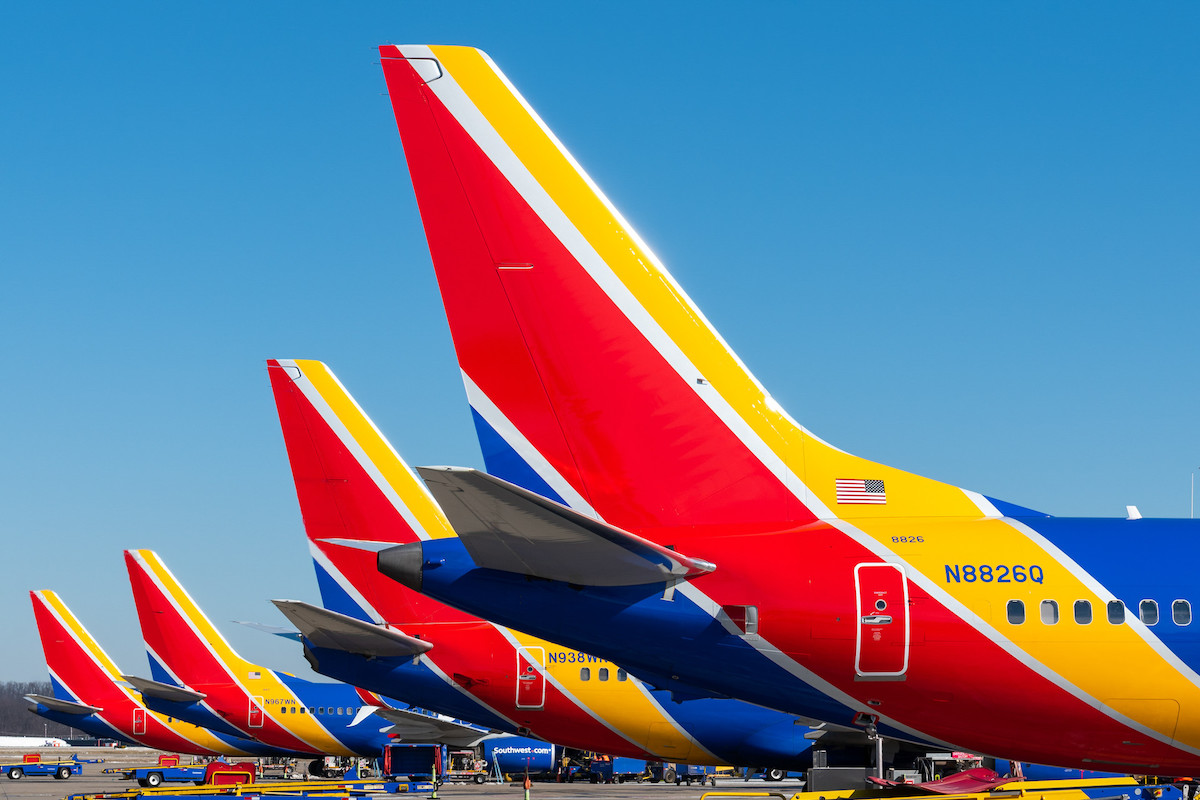Has Southwest Airlines lost its way? One of its biggest long-time advocates seems to think so.
Speaking to Skift, Ryanair CEO Michael O’Leary claimed that Southwest’s generous baggage allowance, onboard perks, and rising average fares means it is no longer a true low-cost carrier.
O’Leary has previously credited the U.S. airline with developing the low-fare format replicated by Ryanair and countless others.
“Southwest’s average fare in the last decade has crept up – their average last year was $170 a seat. That’s not a particularly cheap airline. Our average airfare in Europe was €44 [$47] a seat. I don’t think Southwest is really a low-fares airline anymore,” said the Ryanair chief.
Rising fuel and rising labor costs in the U.S. have disproportionately hit the aviation sector, but Federal Reserve Economic Data suggests the average U.S. airfare across all carriers is actually down compared to 2014.
O’Leary On Why Bags Matter
Putting the sometimes murky world of airfares to one side, O’Leary has a bigger problem with Southwest – its baggage policy.
“The most dramatic development in air travel in the last decade has been charging for checked-in bags. Not because you want the revenue, but because it persuades people. Before we started to charge for bags, 80% of our passengers checked one in. Now it’s down to 20%, which means we have far fewer check-in desks and far fewer baggage-handling staff. We don’t have a lost bag department anymore because there are so few bags – it’s hard to lose them,” quipped O’Leary.
“And yet at Southwest, you go through American airports and people are carrying on five bags, checking in five bags. The whole process is delayed. They put out all this schlock about ‘our passengers are our guests, and you wouldn’t want to charge your guests for their bags,’ but why do you charge for the seats if that’s the case? Give it all away for free.”
Why Southwest Bucks the Trend
Southwest Airlines is widely considered to be a pioneer of the low-cost airline model.
The company’s first flights were in June 1971 with inaugural services to San Antonio and Houston from Love Field in Dallas. In the years that followed, it is credited with transforming the aviation industry with speedy airport turnarounds and other operating efficiencies.
However, in sharp contrast to most other low-fare carriers, Southwest continues to bundle a host of perks into its basic fare.
Alongside two checked bags, passengers enjoy free onboard refreshments, no change fees, and unassigned seating. This has distinguished the firm from more recent ‘ultra-low-cost’ entrants in the U.S. such as Spirit and Frontier.
Even at traditional legacy operators, most economy passengers need to pay extra to place luggage in the hold. For example, Delta Air Lines typically charges $35 and $45 for the first and second checked bags on a domestic flight.
How Southwest Inspired Ryanair
O’Leary’s love affair with Southwest is a now legendary tale in aviation circles.
In the early 1990s, he flew to the U.S. to learn more about the airline’s game-changing business model. In Texas, he met the company’s co-founder and then CEO, Herb Kelleher, and the pair enjoyed a boozy evening talking shop. The Southwest chief helped inspire the young Irish businessman to transform Ryanair from a clunky regional airline into a low-cost powerhouse.
Speaking after Kelleher died in 2019, O’Leary was full of praise for the former Southwest executive, describing him as “the grand master Yoda of low-fare airlines.”
“He was the leader, the visionary, and the teacher: without Herb, there would be no Ryanair, and no low-fares airlines anywhere. His passing is a sad day for low-fare airlines and sales of Wild Turkey bourbon,” reflected the Ryanair CEO.
A Difference of Approach?
Asked by Skift what his long-time low-fares companion would make of today’s Southwest, O’Leary was forthright in his answer. “I think Herb would say follow the Ryanair model; Ryanair is the way forward.”
“If Herb was alive they would be charging for checked-in bags, again not because they want the revenue but because it gets rid of so many of the bags. The plane holds are emptier, the planes fly lighter, there’s less fuel consumption – a huge amount of cost saving comes from charging for checked-in bags.”
Despite O’Leary further stating that “Southwest has lost the passion for low-cost, low-fare air travel,” he wasn’t entirely without praise for the Dallas-based firm. “They’re still by far and away the best and biggest low-fare airline in the States,” added the Ryanair chief.
In response to O’Leary’s comments, a Southwest Airlines spokesperson told Skift: “Southwest is famous for being the pioneer of the low-cost model, and the ‘Southwest Effect,’ notoriously coined by the Department of Transportation, is very much alive today with our all-in value (no change fees, no bag fees, etc.) and legendary hospitality.”
Read more from Skift’s sit-down interview with Michael O’Leary here.
Subscribe to Skift Pro to get unlimited access to stories like these
{{monthly_count}} of {{monthly_limit}} Free Stories Read
Subscribe NowAlready a member? Sign in here
Subscribe to Skift Pro to get unlimited access to stories like these
Your story count resets on {{monthly_reset}}
Already a member? Sign in here
Subscribe to Skift Pro to get unlimited access to stories like these
Already a member? Sign in here
